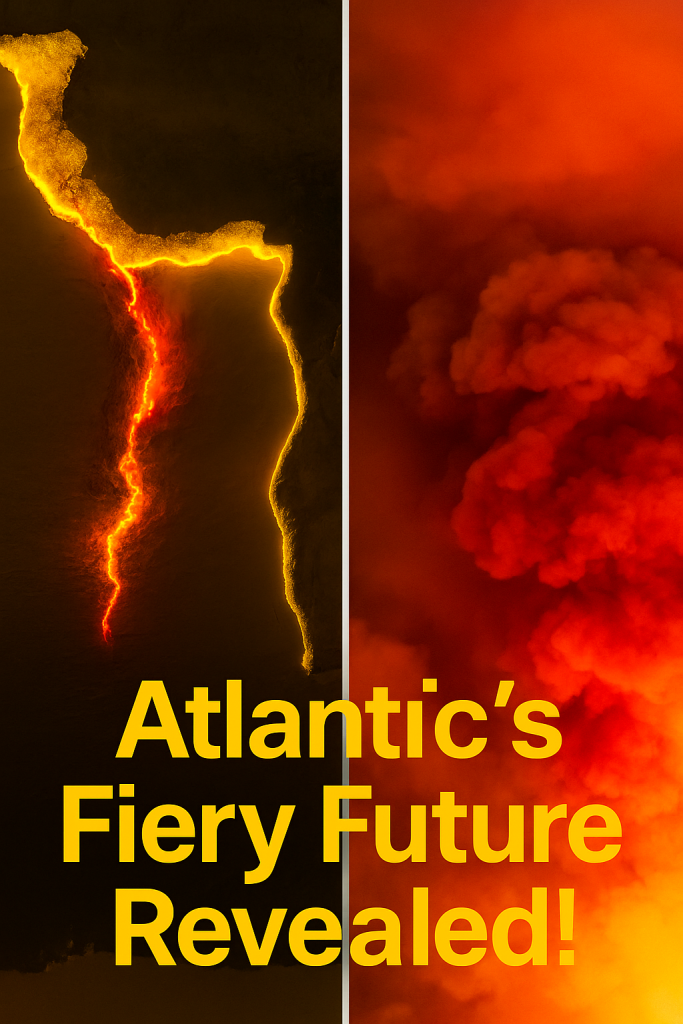Scientists are sounding alarms about a dramatic geological transformation unfolding beneath the Atlantic Ocean — a fiery ring of volcanoes growing more active that could eventually lead to the ocean’s closure. Recent research reveals that this volcanic activity, concentrated along the Atlantic margins, may reshape the ocean basin in ways previously thought to be millions of years away.
This “ring of furious volcanoes,” as some have described it, is the result of tectonic plate movements combined with intense volcanic processes along the Atlantic’s periphery. Although the Atlantic Ocean is known for its expansive mid-ocean ridge, a divergent boundary where new seafloor is created, the new findings highlight convergent volcanic activity along the ocean’s fringes that could eventually cause oceanic closure — an extraordinary reversal in geological terms.
Understanding the Volcanic Ring Phenomenon
Traditionally, the Atlantic Ocean has been expanding due to seafloor spreading at the Mid-Atlantic Ridge. However, recent studies have shown an emerging pattern of volcanic activity encircling portions of the Atlantic’s edges, from the eastern volcanic arcs near the Azores and Canary Islands, to the volcanic hotspots around the Caribbean and parts of the North Atlantic near Greenland and Iceland.
These volcanic chains are becoming increasingly active, with new eruptions and magma intrusions detected. Geologists suggest that this activity is not isolated but part of a larger tectonic process threatening to disrupt the existing balance between spreading and convergence. These volcanic arcs signify subduction zones or localized crustal weaknesses where tectonic plates may begin to converge rather than diverge.
“If these volcanic arcs continue to grow and the tectonic plates begin to shift towards each other, the Atlantic Ocean basin could start closing, effectively reversing millions of years of expansion,” explains a leading geologist involved in recent assessments.
What Could Closing the Atlantic Mean?
The closure of the Atlantic Ocean would be a geological upheaval on a scale rivaling the formation of the supercontinent Pangaea over 300 million years ago. It would mean the continents bordering the Atlantic — the Americas on one side and Europe and Africa on the other — could gradually collide over millions of years.
Such a process would drastically alter global geography, shifting oceanic currents, weather patterns, and ecosystems. Although this event would unfold over tens of millions of years, the accelerating volcanic activity offers scientists a rare opportunity to observe the initial stages of a potential oceanic closure cycle.
Current Evidence and Monitoring Efforts
Sophisticated satellite imagery, seismic monitoring, and underwater exploration missions have recently recorded unprecedented volcanic pulses along the Atlantic margins. In 2023 and early 2024, several minor submarine eruptions and increased seismic tremors were reported in these areas, indicating heightened geothermal activity.
Researchers are also tracking changes in the chemical composition of seawater and underwater volcanic plumes, which provide clues about magma movements beneath the crust. These data help validate models predicting the gradual shift from the Atlantic spreading phase to potential subduction and collision.
The phenomenon has caught widespread attention on social media and scientific forums, sparking debates on its timeline and possible implications for humanity. However, experts emphasize that this is an extremely slow process, with no immediate threat to coastal populations, but rather a profound insight into Earth’s dynamic crustal evolution.
Looking Ahead
While the idea of the Atlantic Ocean closing might sound like science fiction, it is rooted in solid geological principles and evidence. The volcanic ring formation is a natural part of Earth’s ever-changing surface, reminding us of the planet’s restless nature beneath the oceans.



